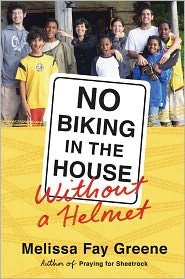Is "hacking high school" a good thing or a bad thing? When I was in school, "hack" was usually a bad thing, like a dull, boring journalist, or breaking into somebody else's computer -- unless it was a good thing, like an amazingly
clever MIT student prank.
Today, hack has several positive connotations, including the idea of achieving a goal (beating your videogame?) by circumventing the rules or following a non-traditional path.
In a
guest post on the New York Times Learning Network, 19-year-old Dale Stephens, founder of
Un-College.org, advocates "hacking," or taking charge of one's own education.
The reality is that school and dropping out are not the only two options. You can hack your education. That means breaking some rules. It may also mean annoying some people. But most important, it means creating options and opportunities for yourself where it seems none exist.

The late Steve Jobs is today's iconic un-college graduate. He dropped out of Reed College after 6 months because he didn't think it was worth his parents' money. What Steve Jobs didn't drop out of, though, was following his curiosity and feeding his passion for learning. He
hacked a college-level education by going to classes that interested him, even when they seemed to have no practical application.
Now more than ever, any student can learn almost anything with a self-directed study plan. Thanks to school and public libraries, it's always been possible to enrich a class you're taking in school, or to learn something not offered in high school, but the 21st century student has practically unlimited resources at hand. In addition to books and DVDs and audios, there is free information through the Internet (as long as you filter carefully for reliability), there are free online classes offered by great universities, there are online tutorials,
TED talk videos, textbooks and how-to videos everywhere, for everything under the sun.
Even an awesome school like Paideia (ok, I am biased, but shouldn't I be?) doesn't have in-depth courses in all the topics that teens can be passionate about, but we can encourage students, formally through independent study, or informally, by supporting the curiosity of students in "hacking" high school.
Last year I
wrote about
Open Culture, a fabulous website that pulls together links to "the best free cultural & educational media on the web." This site could be subtitled "The Official Un-College Bookstore."

Want to learn Japanese but your school doesn't teach it? There are
widgets, podcasts,
free software, a
Facebook page, and even websites that will
connect you to a Japanese speaker for real-time conversational practice. Borrow books on
language and
culture from your school or public library. YouTube videos can show you
how to fold origami, or a
traditional gift wrap.

Want to learn to code Javascript and develop dynamic websites, but your school doesn't teach computer programming? Watch online videos from
Harvard computer science courses, and go through four Javascript
courses at Code Academy. Buy or borrow O'Reilly Media's
series of Javascript manuals, from beginning to advanced. Find and join an online forum, and ask questions of with expert professionals. Or, focus on programming in C (also a Harvard Extension course), then take Stanford University's
Developing Apps for iOS, and start writing and selling iPhone apps.
There's nothing stopping anybody from hacking an awesome education. All it takes is
curiosity (and a free public library card). But, professor and researcher Michael Wesch warns,
I think there's the potential now for a kind of curiosity gap. Consider how much further ahead a curious student will be, compared with a student who lacks curiosity, in an environment in which he or she can reach out and grab new knowledge anytime, anywhere on all kinds of devices. If you’re a curious person, you’ll learn and grow; if you’re not, you could just drift along while others race ahead.
No way am I saying school is irrelevant. Even in this hyper-connected century, school can be an invaluable place for students to learn and grow, AND follow their curiosity. Why? Because schools are full of adults who have learned, who know how to learn, and who have chosen to spend their days helping students learn. Libraries are incredible sources of information in all kinds of media, but without a guide (librarian) for finding, evaluating and understanding, it can be really hard to discern signal from noise, much less process the signal into meaning.
We, the adults in schools, can encourage students to hack as much of their learning as possible. Who knows what will be career-worthy in 2015? Curiosity, drive and knowing how to learn is
always going to be a valuable job & career skill, whether it's in college, graduate school, or the school of hard knocks.
So school can’t just stop at helping students get to the signal amid all the noise but also want to figure out what to do with the signal once they’ve found it –[schools should] help them be curious and excited about where the signal can take them.
net.family news
Curious? Want to follow your interests? Come see me in the library!






